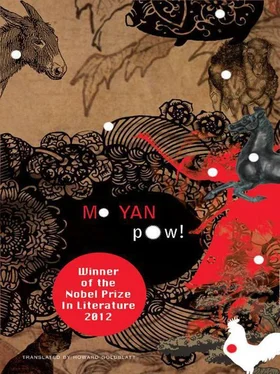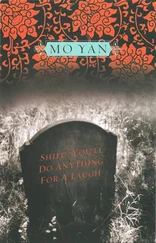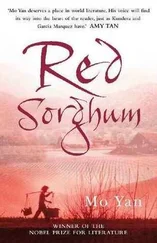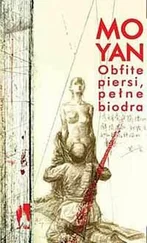Lao Lan was supporting himself by a wooden post at the top of the platform as he gazed off to the northeast. That was where my father used to gaze too. I knew why—it was where he and Aunty Wild Mule had spent days of sadness and moments of joy. What right have you to copy him, Lan Lan? I set my sights on his back. POW! Shell thirty-eight took the top off the spire. He remained unmoved.
The unhappy boy did such a sloppy job in cleaning the thirty-ninth shell that, as he was handing it to the old man, slipped out of his hands and hit the ground. I yelled, taking cover behind the mortar. The shell spun round and round on the rooftop, then we heard a clank. The old man, the old woman and the young boy stood there transfixed, mouths agape. Damn! If the thing explodes here and sets off a chain reaction with the last two shells, all four of us are dead. ‘Hit the ground!’ I shouted but got no reaction from the frozen figures. The shell careened up to my feet as if it wanted to have a heart-to-heart talk. I grabbed it round the neck and flung it as far as I could. POW! It blew up down the lane, wasted. What a shame.
The old man handed me the fortieth shell as if it were a precious object. I did not need a reminder that, after this one left the tube, the end game of the battle against Lao Lan was upon us. I took the shell with care, as though I were carrying the sole infant heir of a hereditary line. My heart was pounding. Briefly reflecting on the first thirty-nine firings, I had to admit that failing to kill Lao Lan was mandated by the heavens; it had nothing to do with a lack of skill on my part. Apparently, even the King of Hell wanted none of Lao Lan. I double-checked the sight, recalculated the distance and reviewed the procedures. Everything was as it should be. Unless a force-three gale erupted while the missile was in flight or it was struck by falling debris from a dying satellite, unless something beyond my ability to predict occurred, this shell ought to land on Lao Lan's head. It would kill him even if it failed to explode. Just before letting the shell slide down the tube, I whispered: ‘Don't fail me, mortar shell!’ It flew into the air. No wind and no satellite debris. It landed on the tip of the platform and—nothing happened.
The old woman threw away what remained of her turnip, took shell forty-one from the old man and shouldered me out of the way. ‘Idiot!’ she muttered. Standing beside the mortar and huffing loudly, she dropped it in the tube. Shell forty-one fluttered out like a kite cut loose from its string. It flew and it flew, a lazy, distracted arc, on and on aimlessly, this way and that, like a young goat running amok. In the end it fell reluctantly to the ground about twenty yards from the rebirth platform. One second and counting, two seconds, three—and nothing. Damn! ‘Another dud.’ The words were barely out of my mouth, when POW! The air shuddered, like ripped cotton. A single piece of shrapnel, a little bigger than the palm of my hand, whistled through the air and sliced Lao Lan in half…
An immature crowing floats on the air from a distant village, the sound of one of this year's young roosters learning how to announce the dawn. I've welcomed the dawn with a narrative replete with artillery fire that has crisscrossed the earth with scars. During the course of my tale, most of the Wutong Temple has crumbled, leaving only a single column perilously holding up part of the dilapidated tile roof, now more like a mat screen against the morning dew. Dear Wise Monk, it no longer matters whether or not I renounce the world. What I want to know is : Has my tale moved you ? What I hope you can tell me is : Is what Lao Lan said about his third uncle true or is it all a lie ? Can you tell me, or not ? The Wise Monk sighs, raises his hand and points to the road in front of the temple. I am surprised to see two processions. The one from the west comprises beef cattle in fancy dress, each with a big character written on its raiments, together spelling out slogans that oppose the construction of the Meat God Temple. There are exactly forty-one heads of cattle. They trot down the road and form a circle at our temple, with the Wise Monk and me in the middle. Daggers have been tied to their horns. Lowering their heads, they seem ready to charge, slobber snorting from their noses, flames of anger shooting from their eyes. The one from the east comprises naked women with big characters written on their bodies, together spelling out slogans that support the rebuilding of the Wutong Temple. There are exactly forty-one naked women. They run down the road, then mount the forty-one bulls like equestriennes and surround the Wise Monk and me. Scared witless, I take refuge behind the Wise Monk but even that is no guarantee of safety. Niang, help me …
Here she comes, followed by Dieh, carrying my sister on his shoulders. She's waving to me. Behind her come the lame and blind Lao Lan and his wife, Fan Zhaoxia, carrying the pretty little Jiaojiao in her arms. Then come the kindly Huang Biao and valiant Huang Bao. Huang Biao's pretty young wife is behind them, smiling enigmatically. They are followed by the swarthy Yao Qi, the corpulent Shen Gang and the hateful Su Zhou. My three meat-eating competitors — Liu Shengli ( Victory Liu ), Feng Tiehan ( Ironman Feng ) and Wan Xiaojiang ( Water Rat Wan )— are next, followed by Lao Han, director of the United Meat Inspection Station, and his assistant Xiao Han. They are followed by the now toothless Cheng Tianle and Ma Kui, almost too old to walk. Behind them come the four skilled artisans from Sculpture Village and, in their wake, the old-school paper craftsman and his apprentice, who are right in front of the silver-lipped, golden-haired new-school paper craftswoman and her assistant. The foreman, Big Four, wearing a suit with the trouser legs rolled up, and his assistants follow them and are in turn followed by the old, nearly toothless master musician and members of his troupe. They come just ahead of the old monk from Tianqi Temple, with his wooden fish and his flock of semi-authentic little acolytes. They are followed by Teacher Cai of the Hanlin School and a group of her students. Behind them come medical-school students Tiangua and her sissy boyfriend. They are followed by the boy who polished my mortar shells and the chivalrous old husband and wife, then the crowds who showed up in the Meat God compound, on the highway and at the open square. Next come the photographer, Skinny Horse, and the video-cameraman, Pan Sun, and his assistant. They climb a tree with their equipment to record everything below. But there is also a large contingent of women, led by Miss Shen Yaoyao, followed by Miss Huang Feiyun and the singer Tian Mimi — I can't make out the rest, but in their finery they are like a gorgeous sunset. The entire scene is a painting fixed in time, as a woman who looks like she has just emerged from her bath, exuding feminine charms, her appearance five parts Aunty Wild Mule and five parts a woman I've never seen, splits the people and the bulls and walks towards me …
AFTERWORD
Narration Is Everything
A good many people will, consciously or unconsciously, often wish they never had to grow up. This sort of evocative literary theme was explored in a work by German novelist Günter Grass decades ago. But here's the problem. When you read something someone else has written and try to make it your own, yours becomes derivative, a form of copying. Oskar, the protagonist of Grass’ The Tin Drum (1959), who had witnessed so much ugliness in the world, falls into a wine cellar at the age of three and stops growing. Only his physical growth is stunted; mentally he keeps maturing, but in almost evil ways, outgrowing everyone in this regard, gaining a greater complexity. Nothing like that is likely to happen in real life, and for that very reason its appearance in fiction is not only deeply meaningful but also thought-provoking.
Читать дальше












